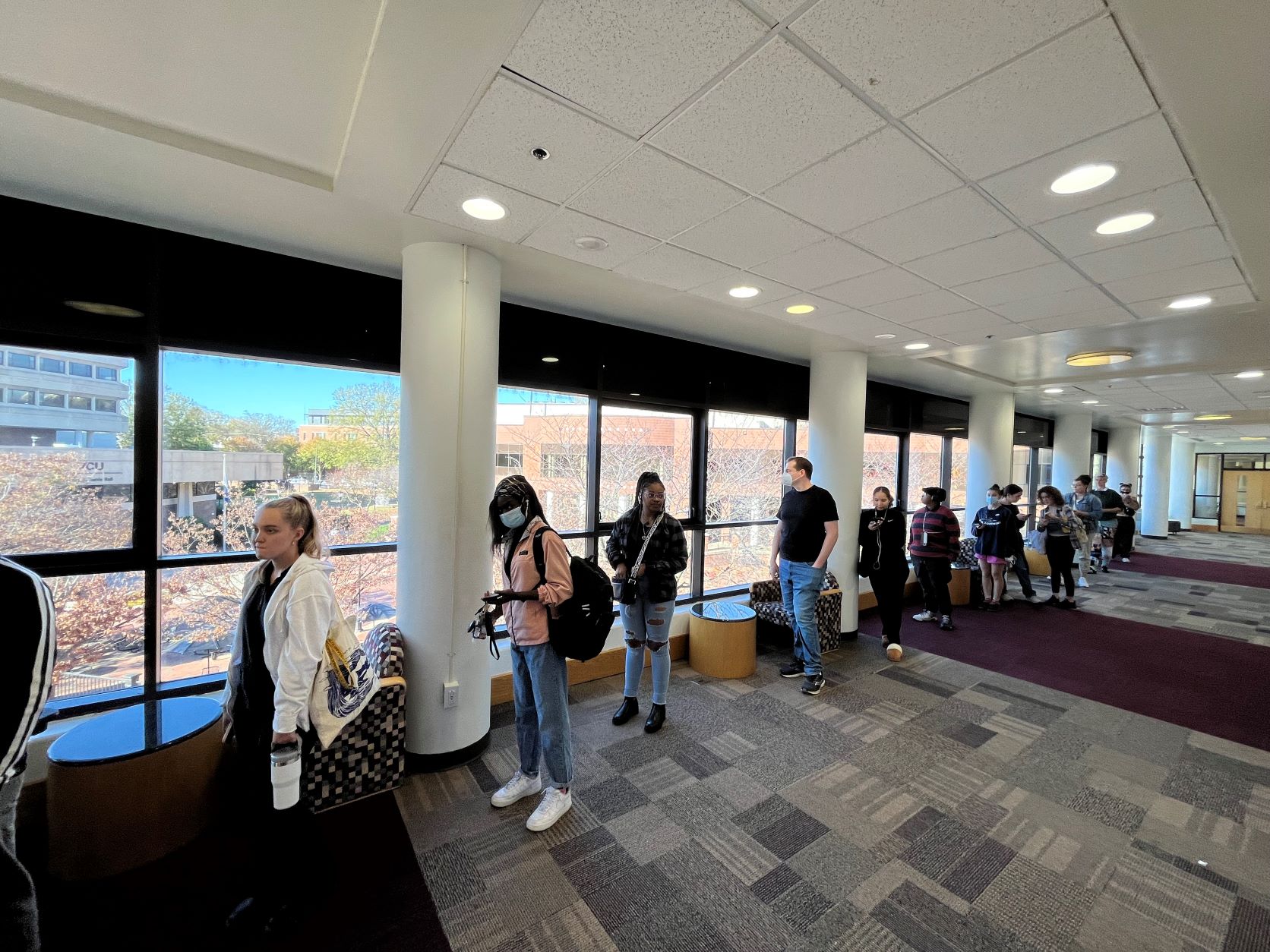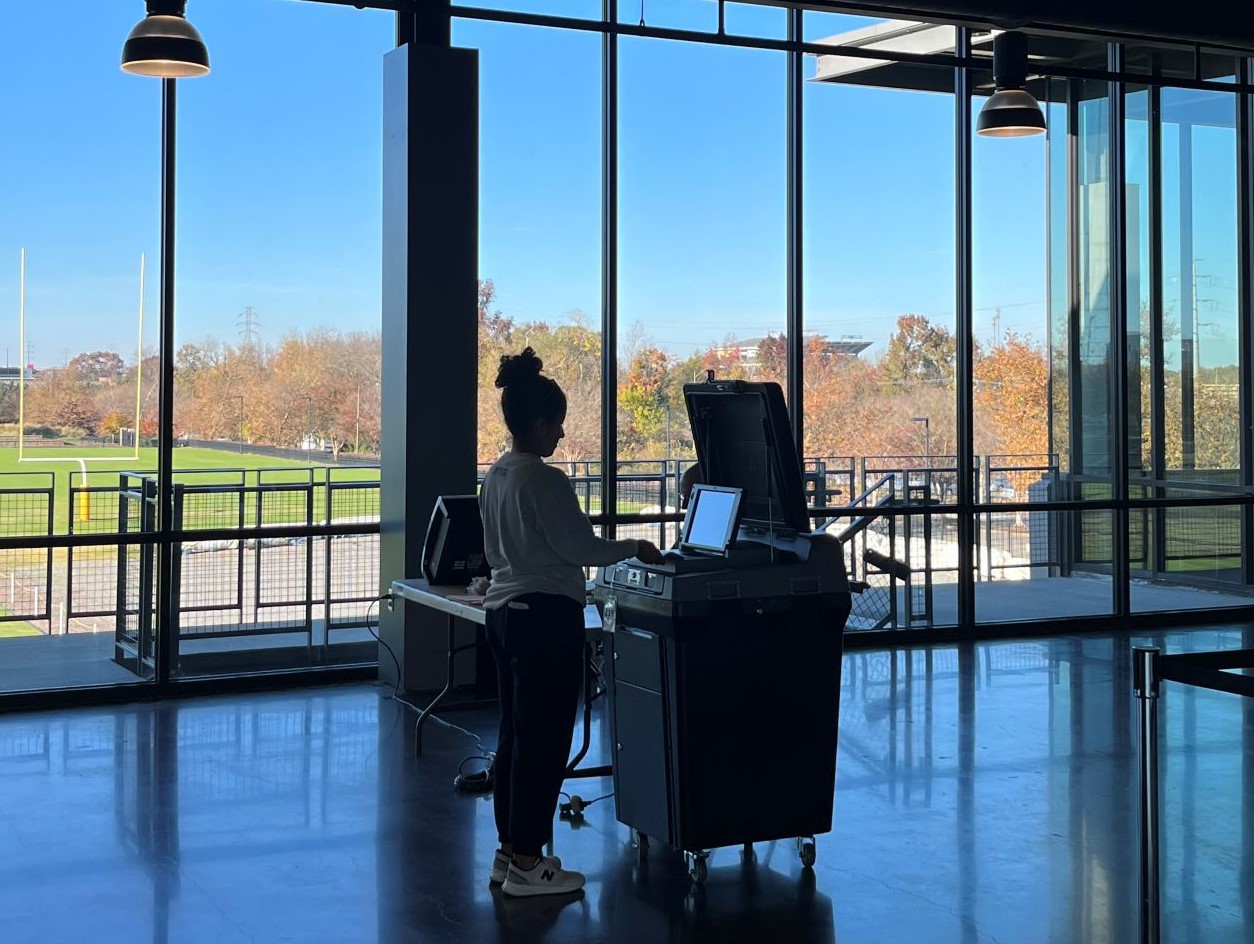Voting
Voters can find details about how to vote, where to vote, what’s on the ballot, and when election results are available.
 |
 |
Voting In-person
When voting in person, voters are asked to show an acceptable form of identification.
If a voter does not have identification available, they may sign a statement affirming their identity. This statement is signed under penalty of felony. Voters who do not present identification or sign the statement will vote using a provisional ballot.
| Type of Identification | Examples |
|---|---|
| Virginia voter photo ID | Voter photo ID issued by the Virginia Department of Elections |
| Government-issued photo ID | Virginia driver’s license, DMV-issued ID card, U.S. passport, military ID |
| Student photo ID | Student ID issued by a Virginia college or university |
| Employer-issued photo ID | Employee ID with photo |
| Utility bill or government document | Utility bill, bank statement, government check, paycheck, or other official document with the voter’s name and address |
| Other acceptable ID | Any valid photo ID issued by the federal government, the Commonwealth of Virginia, or a local government |
Early Voting
Early voting allows voters to cast a ballot in person before Election Day. This option is available during designated early voting periods and provides flexibility for voters who may not be able to vote on Election Day.
Early voting dates, times, and any changes to availability are shared by the Richmond Office of Elections ahead of each election.
Please note:
Some early voting locations may open later than usual on select days.
Early Voting Locations
| Location Name | Address | Hours | Notes |
|---|---|---|---|
| Office of Elections | 2134 W. Laburnum Ave. | 8:30 a.m. – 5:00 p.m. | Monday-Friday |
| City Hall | 900 E. Broad St. | 8:30 a.m. – 5:00 p.m. | Monday-Friday |
| Hickory Hill Community Center | 3000 East Belt Blvd. | 8:30 a.m. – 5:00 p.m. | Monday-Friday |
Important Updates
Any changes to voting locations or hours will be shared on the News | Updates page.
Voters can request an absentee ballot online, in person at the Office of Elections, by fax (804-646-7848), or by email ([email protected]).
Prefer the ease and comfort of voting from home? Virginia law allows voters the option to join a Permanent Vote By Mail Roster and have their ballots sent directly to their preferred address ahead of every election.
Click here to apply to Vote By Mail and join the Permanent Roster. Make sure you complete section 3 of the application. You can access the paper absentee application here.
Emergency Absentee Voting form (Code of Virginia 24.2-705).
All absentee ballots, those sent by mail and those cast in-person, are counted on Election Day in Virginia. Ballots must be postmarked by Election Day or dropped off at the Office of Elections no later than 7:00 p.m. on Election Day.
IMPORTANT – Please mark your ballot using a black or blue pen.
What if I received an absentee ballot by mail but I want to vote in person?
1. Return your un-voted ballot by mail.
• Leave or reseal your un-voted ballot in Envelope A and mail using the pre‐addressed return envelope.
• You will receive a new ballot when you go to vote in person.
2. Take your un-voted ballot with you when you go to vote early in person or on Election Day.
Important! If you lost your absentee ballot, you can still vote in person. Notify the election official when you come in person to vote. If you choose to vote in person and do not return your un-voted ballot, you will be offered a provisional ballot which will be reviewed for counting after Election Day.
Ballot Drop Boxes were introduced in 2020 as an initiative to provide voters with a secure alternative option to return their ballot.
Ballot Drop Boxes provide voters with a safe, accessible, contact free method to return their voted ballot.
What You Need to Know:
Drop boxes, which are monitored by video surveillance, are available to the public during normal business hours.
Ballots are collected daily from drop boxes by staff of the General Registrar.
Before you return your ballot:
Make sure you seal it inside Envelope B.
Fill in all spaces on the Statement of Voter on Envelope B.
If you make a mistake marking your ballot, or if you lose or damage your ballot, please contact our office at (804) 646-5950 or at [email protected].
To track your ballot as it makes its way through the mail stream click here.
If you would like more information about election laws at the federal, state, and local level, click the links below to visit various resourceful and informational sites.
Federal Laws
Statues enforced by the Voting Section of the Department of Justice
State Laws
24.2 of the Code of Virginia
Local Laws
Ordinances regarding elections
Commonly referred to as the EAC, the United States Election Assistance Commission was created as a result of the Help America Vote Act (HAVA) and is charged with developing guidance to meet HAVA requirements, adopting voluntary voting system guidelines, and serving as a national clearinghouse of information on election administration. EAC also accredits testing laboratories and certifies voting systems, as well as audits the use of HAVA funds.
United States Election Assistance Commission
In an effort to promote transparency and improvement within our office, and to provide the public with a written historical document of every November election, we will release annual post-election reports that seek to tell the story of the election from the perspective of our staff and our election officers.
Guidance for Authorized Representatives and Neutral Observers
- Authorized Representatives:
- One authorized representative of each political party or independent candidate in a general or special election, or one authorized representative of each candidate in a primary election, is permitted to remain in the room where the election is conducted at all times.
- Representatives may serve part of the day and be replaced by successive representatives.
- The officers of election have discretion to permit up to three authorized representatives of each political party or independent candidate in a general or special election, or up to three authorized representatives of each candidate in a primary election, to remain in the room.
- The officers shall permit one such representative for each pollbook station.
- However, no more than one representative for each pollbook station or three representatives of any political party or independent candidate, whichever number is larger, shall be permitted in the room at any one time.
- Qualifications and Designation:
- Each authorized representative must be a qualified voter of any jurisdiction within the Commonwealth of Virginia.
- No candidate whose name is printed on the ballot may serve as a representative of a party or a candidate.
- Each representative shall present a written statement, signed by the city chairman of the political party, the independent candidate, or the primary candidate as appropriate, designating them as a representative of the party or candidate. If the city chairman is unavailable, the state or district chairman may provide such a designation.
- Observational Rights:
- Authorized representatives are allowed to be close enough to the voter check-in table to hear and see what is occurring.
- Such observation shall not violate the secret vote provision of Article II, Section 3 of the Constitution of Virginia or otherwise interfere with the orderly process of the election.
- Any representative who is unable to hear or see the process may accept the chief officer of election’s decision or, is dissatisfied, may immediately appeal the decision to the local electoral board or general registrar.
- Use of Handheld Wireless Communication Devices:
- Authorized representatives are allowed to use handheld wireless communication devices.
- However, they are not allowed to use such devices to capture a digital image inside the polling place or central absentee voter precinct.
- The officers of election may prohibit the use of cellular telephones or other handheld wireless communication devices if they are using their device to capture digital images from within the polling place.
- Prohibited Assistance:
- Authorized representatives are not allowed to provide assistance to any voter.
- They are also prohibited from wearing any indication that they are authorized to assist voters either inside the polling place or within 40 feet of any entrance to the polling place.
- Enforcement and Removal:
- The officers of election may require any person found to be in violation of state election law to remain outside of the prohibited area.
- Neutral Observers:
- A local electoral board or general registrar may authorize in writing the presence of additional neutral observers as deemed appropriate.
- These observers shall not provide assistance to any voter or wear any indication that they are authorized to assist voters either inside the polling place, or within 40 feet of any entrance to the polling place.
- The officers of election may require any person found to be in violation of state election law to remain outside of the prohibited area.
The Uniformed and Overseas Citizens Absentee Voting Act (UOCAVA) allows U.S. military members and citizens living overseas to vote in federal elections. Here’s a simple breakdown of how the process works:
Who can vote under UOCAVA?
Active-duty members of the military, including the Army, Navy, Air Force, Marines, and Coast Guard.
U.S. citizens living overseas, whether for work, study, or personal reasons.
How to register?
You can register to vote and request an absentee ballot by completing the Federal Post Card Application (FPCA).
This form registers you to vote and requests a ballot for federal elections, and state and local elections (if you are eligible).
How to cast your vote?
Once you register, you’ll receive an absentee ballot from our office. You can vote on the ballot and return it by mail. If you don’t receive your ballot in time, you can use the Federal Write-In Absentee Ballot (FWAB) as a backup.
Deadlines:
The deadline for overseas citizens to submit an FPCA is 21 days before Election Day. There is no registration deadline for members of the military. It's important to request your absentee ballot as early as possible and return it before the deadline to make sure your vote counts.
Visit the Department of Elections website for more information.







